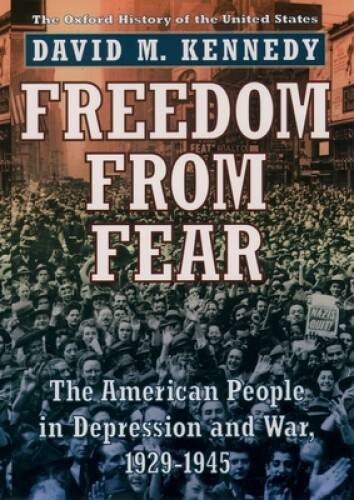
Item specifics
-
Condition
-
-
Brand
-
Unbranded
-
MPN
-
Does not apply
-
ISBN
-
9780195144031
-
Book Title
-
Freedom from Fear : the American People in Depression and War, 1929-1945
-
Book Series
-
Oxford History of the United States Ser.
-
Publisher
-
Oxford University Press, Incorporated
-
Item Length
-
6.2 in
-
Publication Year
-
2001
-
Format
-
Trade Paperback
-
Language
-
English
-
Illustrator
-
Yes
-
Item Height
-
2.2 in
-
Features
-
Reprint
-
Genre
-
Business & Economics, History
-
Topic
-
United States / 20th Century, Economic History, United States / General
-
Item Weight
-
42.3 Oz
-
Item Width
-
9.2 in
-
Number of Pages
-
992 Pages
Freedom from Fear: The American People in Depression and War, 1929-1945 ( – GOOD
About this product
Product Identifiers
Publisher
Oxford University Press, Incorporated
ISBN-10
0195144031
ISBN-13
9780195144031
eBay Product ID (ePID)
1775038
Product Key Features
Book Title
Freedom from Fear : the American People in Depression and War, 1929-1945
Number of Pages
992 Pages
Language
English
Publication Year
2001
Topic
United States / 20th Century, Economic History, United States / General
Features
Reprint
Illustrator
Yes
Genre
Business & Economics, History
Book Series
Oxford History of the United States Ser.
Format
Trade Paperback
Dimensions
Item Height
2.2 in
Item Weight
42.3 Oz
Item Length
6.2 in
Item Width
9.2 in
Additional Product Features
Intended Audience
Trade
LCCN
98-049580
Reviews
“A sophisticated and complete one-volume history of a traumatic periodsuch as the Great Depression or World War II…. Kennedy gives a seamlessaccount of the war.”–Mark Gamin, Cleveland Plain Dealer, “This is modern America’s story–modern America’s most thrilling, most irresistible, and most significant story–and in this massive volume, David M. Kennedy makes it his story in a way that no one has before. Freedom From Fear, the fourth installment of the new Oxford History of the UnitedStates to appear, is as much a triumph as its predecessors, providing every indication that the series, once completed, will stand as the most comprehensive and most compelling narrative history of the nation.”–David M. Shribman, Boston Globe, “An elegant book, beautifully written and remarkably quick to read. In the realm of narrative history, as the saying goes, it doesn’t get any better than this….The author is both a master at guiding the reader through the diplomatic thicket of that era and a first-rate chronicler of theinvasions, land campaigns, sea battles, and air strikes in every theater of the War.”–David M. Oshinsky, The New Leader, “One of our most broad-gauged American historians brings us thatincreasing rarity: a big book about a big subject…. The Stanford scholar takeson the job of tracing the American people through three of the most importantand important and widely written about epochs in the century…and provides uswith consistently original and sometimes startling conclusions.”–The WashingtonPost, “Kennedy skillfully weaves together the era’s social, economic, andpolitical strands. Even those who thought they knew it all, or who indeed livedthrough all or most of these years, will find illuminating information andinsights on almost every page”–Los Angeles Times Book Review, “Splendid…. It is a worthy addition to the multi-volume ‘Oxford Historyof the United States’ and deserves to become the standard work of introductionto its three subjects–the Depression, the New Deal, and America’s part in thesecond world war…. Mr. Kennedy is master of his material in a double sense.He exhibits a comprehensive knowledge of events, making very few factualslips… The benefit, in terms of clarity, is immense…. This is one of themost valuable forms of scholarly originality, and it will make itself felt overa long time.”–The Economist, “By linking the Depression and World War II…David Kennedy has undertaken an original approach to modern history…. [he] provides a grand historical synthesis in Freedom From Fear…. this is the kind of book prizes are made for.”–Herbert Mitgang, Chicago Tribune, “Displaying a literary craft uncommon in survey works, he has woventogether narrative, sketches of character, and critical judgment to record andanalyze the economic, political, social, and military events of these epicyears…. This account of the crucial struggles and events of the Depression andwar years will lend perspective like few others.”–Library Journal, “Kennedy combines the best aspects of narrative and history. Hiswonderful single-volume history of the era is comprehensive and well researched,and schlars will find much that is new and informative…. It is a smoothlyflowing and easily digestible account of great events, and well-informed layreaders will have little difficulty in following and appreciating this saga….This is a work replete with revealing subtexts, and Rooselvelt’s relations adnstruggles with African American leaders are especially fascinating. It is aworthy addition to an outstanding series and an essential component to a U.S.history collection for both public and college libraries.”–Booklist, “A grand historical synthesis… this is the kind of book prizes are made for.” — Chicago Tribune “This is modern America’s story–modern America’s most thrilling, most irresistible, and most significant story–and in this massive volume, David M. Kennedy makes it his story in a way that no one has before. Freedom From Fear , the fourth installment of the new Oxford History of the United States to appear, is as much a triumph as its predecessors, providing every indication that the series, once completed, will stand as the most comprehensive and most compelling narrative history of the nation.” — Boston Globe “Rarely does a work of historical synthesis combine such trenchant analysis and elegant writing as does Kennedy’s spectacular contribution to the Oxford History of the United States. Kennedy uses a wide canvas to depict all aspects of the American political, social and economic experience from 1929 to 1945. He also provides a stunningly original reinterpretation of the competing forces and interests that combined to shape the New Deal under FDR’s direction. The book’s final 400 pages admirably demonstrate exactly how the U.S. emerged victorious in WWII…. Because of its scope, its insight and its purring narrative engine, Kennedy’s book will stand for years to come as the definitive history of the most important decades of the American Century.” — Publishers Weekly “An engrossing narrative of a momentous time. The best one-volume account of the Roosevelt era currently available…. Good old-fashioned history.”– The New York Times Book Review “An indispensable account of the two great formative events of 20th century American history–the Great Depression and the second World War.” — The Economist “The book…has my strong approval. As it will have, I cannot doubt, that of the many readers it deserves.”–John C. Gilbraith, The Washington Monthly “An invaluable compendium of the hyperactive period that contains the Great depression and the Second World War.” — The Washington Times “Kennedy’s book is the most illuminating, riveting, comprehensive, and graceful one-volume history of this nation’s experiences during the Great Depression, New Deal, and WWII published to date…. This is social, political, dipolmatic, and military history written magisterially with broad but nuanced strokes across a 16-year span that utterly transformed the lives of Americans and the world…. Librarians should order this book for their libraries, faculty members should assign it, and everyone should read it.”– Choice “Kennedy’s grasp of deep-rooted social problems and his enlightening, analytical style are very much in evidence…. [he] brilliantly explores the conflicting nuances of [Roosevelt’s] character and program…. Kennedy has achieved a judicious balance in his treatment of the Depression and the military operations and diplomatic maneuvers of World War II. His narrative style is in the grand tradition of American historical writing, an unfaltering display of clarity and detail.” — Philadephia Inquirer “No other book so vividly captures the spirit of those 17 years that forever changed America.”– Christian Science Monitor “One of our most broad-gauged American historians brings us that increasing rarity: a big book about a big subject…. The Stanford scholar takes on the job of tracing the American people through three of the most important and important and widely written about epochs in the century…and provides us with consistently original and sometimes startling conclusions.”– The Washington Post “A major achievement in objective historical writing that should be a legacy to generations of students seeking authoritative reference material on the period.”</, “This is an enormous book, heavy to carry and light and very agreeable toread…. Kennedy holds firmly the attention of the reader, conveying a sense ofboth serious care and competence, all in good, unassuming English…. Thebook…has my strong approval. As it will have, I cannot doubt, that of themany readers it deserves.”–John Kenneth Galbraith, The WashingtonMonthly, “David Kennedy is one of America’s most distinguished historians, and Freedom from Fear is a remarkable achievement: deeply researched, insightful, and beautifully written. Fast-paced, it presents vivid portraits of major actors such as Roosevelt, Churchill, and Hitler, as well as of thehopes and fears of millions of lesser-known people caught up in the tumultuous years of the Great Depression and of World War II.”–James T. Patterson, Bancroft Prize-winning author of Grand Expectations, “From its dramatic prelude depicting Franklin Roosevelt, Winston Churchill, Adolf Hitler, and Joseph Stalin hearing the news of the end of World War I on November 11, 1918, to its moving climax on board the USS Missouri in Tokyo Bay on September 2, 1945, this panoramic narrative pulses withlife, color, incident, and action. We know how it all comes out, yet the fate of the nation seems to hang in the balance as Kennedy captures history’s throat-catching contingency.” –Jack Beatty, author of The Rascal King: The Life and Times of James Michael Curley and The World According to PeterDrucker, “By linking the Depression and World War II…David Kennedy has undertakenan original approach to modern history…. [he] provides a grand historicalsynthesis in Freedom From Fear…. this is the kind of book prizes are madefor.”–Herbert Mitgang, Chicago Tribune, “An indispensable account of the two great formative events of 20thcentury American history–the Great Depression and the second World War.”–TheEconomist, “It’s hard to think of a more interesting time in American history than the years of the Great Depression and the Second World War–or an historian better able to bring it to life than David Kennedy.”–Evan Thomas, author of The Very Best and co-author of The Wise Men:Five Friends and theWorld They Made, “An elegant book, beautifully written and remarkably quick to read. In therealm of narrative history, as the saying goes, it doesn’t get any better thanthis….The author is both a master at guiding the reader through the diplomaticthicket of that era and a first-rate chronicler of the invasions, landcampaigns, sea battles, and air strikes in every theater of the War.”–David M.Oshinsky, The New Leader, “Kennedy skillfully weaves together the era’s social, economic, and political strands. Even those who thought they knew it all, or who indeed lived through all or most of these years, will find illuminating information and insights on almost every page”–Los Angeles Times Book Review, “In Freedom from Fear, David Kennedy combines the synthetic talents of abrilliant historian with the literary gifts of a great storyteller. The resultis engrossing history, with all the complex characters and suspense of highdrama put impressivley to the task of demonstrating how a decade and a half ofGreat Depression and World War have shaped the rest of our century.”–LizabethCohen, Harvard University, “An indispensable account of the two great formative events of 20th century American history–the Great Depression and the second World War.”–The Economist, “David Kennedy’s panoramic history of America and the world between 1929 and 1945 is a superb reconstruction of the era that formed our times. Simply put, it is a brilliant narrative and analysis. Anyone who wants to understand our century needs to read Kennedy’s book.”–Robert Dallek,Boston University, author of Flawed Giant: Lyndon Johnson and his Times, 1961-1973, “One of our most broad-gauged American historians brings us that increasing rarity: a big book about a big subject…. The Stanford scholar takes on the job of tracing the American people through three of the most important and important and widely written about epochs in the century…andprovides us with consistently original and sometimes startling conclusions.”–The Washington Post, “We expect the best from David Kennedy and he will not disappoint anybody with this competent, complete and literate volume. Covering a time of large and intense change, it is all here. A major and thoroughly fine piece of work.”–John Kenneth Galbraith, “A sophisticated and complete one-volume history of a traumatic period such as the Great Depression or World War II…. Kennedy gives a seamless account of the war.”–Mark Gamin, Cleveland Plain Dealer, “Splendid…. It is a worthy addition to the multi-volume ‘Oxford History of the United States’ and deserves to become the standard work of introduction to its three subjects–the Depression, the New Deal, and America’s part in the second world war…. Mr. Kennedy is master of his material ina double sense. He exhibits a comprehensive knowledge of events, making very few factual slips… The benefit, in terms of clarity, is immense…. This is one of the most valuable forms of scholarly originality, and it will make itself felt over a long time.”–The Economist, Freedom from Fear brings together in one place the epic story of howAmerica faced the greatest challenges in its history. At a time when we tend tobemoan our selfish preoccupations, it is bracing to read David Kennedy’s movingaccount of our better selves. This is history the way it ought to be.– AlanWolfe, Boston University, author of One Nation After All
Dewey Edition
21
Series Volume Number
Vol. 9
Dewey Decimal
973 s 973.91
Table Of Content
MapsAcknowledgmentsEditor’s IntroductionAbbreviated Titles Used in CitationsPrologue: November 11, 19181. The American People on the Eve of the Great Depression2. Panic3. The Ordeal of Herbert Hoover4. Interregnum5. The Hundred Days6. The Ordeal of the American People7. Chasing the Phantom of Recovery8. The Rumble of Discontent9. A Season for Reform10. Strike!11. The Ordeal of Franklin Roosevelt12. What the New Deal Did13. The Gathering Storm14. The Agony of Neutrality15. To the Brink16. War in the Pacific17. Unready Ally, Uneasy Alliance18. The War of Machines19. The Struggle for a Second Front20. The Battle for Northwest Europe21. The Cauldron of the Home Front22. EndgameEpilogue: The World the War MadeBibliographical EssayIndex
Edition Description
Reprint
Synopsis
Between 1929 and 1945, two great travails were visited upon the American people: the Great Depression and World War II. This book tells the story of how Americans endured, and eventually prevailed, in the face of those unprecedented calamities. The Depression was both a disaster and an opportunity. As David Kennedy vividly demonstrates, the economic crisis of the 1930s was far more than a simple reaction to the alleged excesses of the 1920s. For more than a century before 1929, America’s unbridled industrial revolution had gyrated through repeated boom and bust cycles, wastefully consuming capital and inflicting untold misery on city and countryside alike. Freedom From Fear explores how the nation agonized over its role in World War II, how it fought the war, why the United States won, and why the consequences of victory were sometimes sweet, sometimes ironic. In a compelling narrative, Kennedy analyzes the determinants of American strategy, the painful choices faced by commanders and statesmen, and the agonies inflicted on the millions of ordinary Americans who were compelled to swallow their fears and face battle as best they could. Both comprehensive and colorful, this account of the most convulsive period in American history, excepting only the Civil War, reveals a period that formed the crucible in which modern America was formed. The Oxford History of the United States The Atlantic Monthly has praised The Oxford History of the United States as “the most distinguished series in American historical scholarship,” a series that “synthesizes a generation’s worth of historical inquiry and knowledge into one literally state-of-the-art book. Who touches these books touches a profession.” Conceived under the general editorship of one of the leading American historians of our time, C. Vann Woodward, The Oxford History of the United States blends social, political, economic, cultural, diplomatic, and military history into coherent and vividly written narrative. Previous volumes are Robert Middlekauff’s The Glorious Cause: The American Revolution ; James M. McPherson’s Battle Cry of Freedom: The Civil War Era (which won a Pulitzer Prize and was a New York Times Best Seller); and James T. Patterson’s Grand Expectations: The United States 1945-1974 (which won a Bancroft Prize)., Between 1929 and 1945, two great travails were visited upon the American people: the Great Depression and World War II. This book tells the story of how Americans endured, and eventually prevailed, in the face of those unprecedented calamities. The Depression was both a disaster and an opportunity. As David Kennedy vividly demonstrates, the economic crisis of the 1930s was far more than a simple reaction to the alleged excesses of the 1920s. For more than a century before 1929, America’s unbridled industrial revolution had gyrated through repeated boom and bust cycles, wastefully consuming capital and inflicting untold misery on city and countryside alike. Freedom From Fear explores how the nation agonized over its role in World War II, how it fought the war, why the United States won, and why the consequences of victory were sometimes sweet, sometimes ironic. In a compelling narrative, Kennedy analyzes the determinants of American strategy, the painful choices faced by commanders and statesmen, and the agonies inflicted on the millions of ordinary Americans who were compelled to swallow their fears and face battle as best they could. Both comprehensive and colorful, this account of the most convulsive period in American history, excepting only the Civil War, reveals a period that formed the crucible in which modern America was formed. The Oxford History of the United States The Atlantic Monthly has praised The Oxford History of the United States as “the most distinguished series in American historical scholarship,” a series that “synthesizes a generation’s worth of historical inquiry and knowledge into one literally state-of-the-art book. Who touches these books touches a profession.” Conceived under the general editorship of one of the leading American historians of our time, C. Vann Woodward, The Oxford History of the United States blends social, political, economic, cultural, diplomatic, and military history into coherent and vividly written narrative. Previous volumes are Robert Middlekauff’s The Glorious Cause: The American Revolution; James M. McPherson’s Battle Cry of Freedom: The Civil War Era (which won a Pulitzer Prize and was a New York Times Best Seller); and James T. Patterson’s Grand Expectations: The United States 1945-1974 (which won a Bancroft Prize)., Between 1929 and 1945, two great travails were visited upon the American people: the Great Depression and World War II. Freedom from Fear tells the story of how Americans endured, and eventually prevailed, in the face of those unprecedented calamities., Between 1929 and 1945, two great travails were visited upon the American people: the Great Depression and World War II. Freedom from Fear tells the story of how Americans endured, and eventually prevailed, in the face of those unprecedented calamities.The Depression was both a disaster and an opportunity. As David Kennedy vividly demonstrates, the economic crisis of the 1930s was far more than a simple reaction to the alleged excesses of the 1920s. For more than a century before 1929, America’s unbridled industrial revolution had gyrated through repeated boom and bust cycles, wastefullly consuming capital and inflicting untold misery on city and countryside alike. Nor was the fabled prosperity of the 1920s as uniformly shared ag legend portrays. Countless Americans, especially if they were farmers, African Americans, or recent immigrants, eked out thread bare lives on the margins of national life. For them the Depression was but another of the ordeals of fear and insecurity with which they were sadly familiar.Franklin Roosevelt’s New Deal wrung from the trauma of the 1930s a lasting legacy of economic and social reform, in cluding the Social Security Act, new banking and financial laws, regulatory legistlation, and new opportunities for organized labour. Taken together, those reforms gave a measure of security to millons of Americans who had never had much of it, and with a fresh sense of having a stake in their country.Freedom from Fear tells the story of the New Deal’s achievments, without slighting its shortcomings, contraditions and failures. It is a story rinch in drama and peopled with unforgettable personalities, including the incandescent but enigmatic figure of Roosevelt himself.Even as the New Deal was coping with the Depression, a still more fearsome menace was developing abroad–Hitler’s thirst for war in Europe, coupled with the imperial ambitions of Japan in Asia. The same generation of Americans who battled the Depression evenutally had to shoulder the arms in another conflict that wreaked world wide destruction, ushered in the nuclear age and forever changed their own way of life and their country’s relationship to the rest of the world. Freedom from Fear explains how the nation agonized over its role in World War II, how it fought the war, why the United States won, and why the consequences of victory were sometimes sweet, sometimes ironic. In a compelling narrative, Kenney analyses the determinants of American strategy, the painful choices faced by commanders and statesmen, and the agonies inflicted on the millions of ordinary Americans who were compelled to swallow their fears and face battle as best they could.Freedom from Fear is a comprehensive and colourful account of the most convulsive period in American history, excepting only the Civil War – a period that formed the crucible in which modern America was formed.
LC Classification Number
E173.094
Price : 5.20 – 5.00
Ends on : N/A
View on eBay



